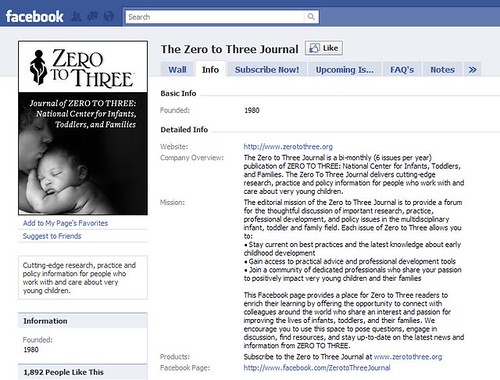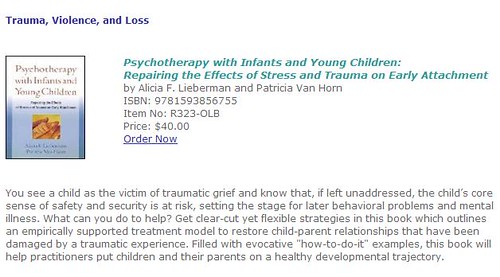This should help practitioners to jump into providing services to young children with both feet. -gw
+
The Peninsula Regional Support Network presents…. |
+
Assessment of Infants and Toddlers within a Family Context: Practitioner Preparation to Use the DC: 0-3 R™
DC: 0-3 is published by ZERO TO THREE.
Dates: Day 1 Monday, September 21, 2010 Time: 8:30 a.m. to 4:30 p.m.
AND
Day 2 Tuesday, September 22, 2010 Time: 8:30 a.m. to 3:30 p.m.
(Sign in/Hospitality: Begins 8:00 a.m. on each day.)
Location: Fort Worden-John F. Kennedy Hall—Port Towsend
Audience: Mental health clinicians and supervisors, infant mental health specialists, social workers, psychologists, therapists, pediatricians, nurses, and other professionals interested in the use of the DC: 0-3 R™.
Content: DC: 0-3 R™ responds to the needs for a diagnostic system that accounts for the unique developmental and relational needs of infants/toddlers in the context of their families. This 2 day intensive workshop for mental health clinicians, supervisors and other therapists addresses: the axes and diagnostic classifications used in DC: 0-3 R™; assessment, evaluation and diagnosis of very young children; and use of crosswalks between ZERO TO THREE’s DC: 0-3 R™ and DSM-IV and ICD-9 or 10. This in-depth training will use lecture, video, case presentation and discussion. Participants will discuss the unique developmental needs of very young children and apply clinical reasoning in developing diagnoses using clinical videotaping or printed case examples.
Presenter: Donna R. Weston, Ph.D., Developmental Psychologist, Licensed Psychologist, and infant mental health clinician with over 25 years of experience, and a member of ZERO TO THREE’s DC: 0-3 Task Force and Training Task Force. Dr. Weston is also in the Department of Psychiatry and Behavioral Sciences at the University of Washington and has a private practice in Seattle, Washington.
Contact: For registration complete attached form and return ASAP as space is limited questions please contact Linda Ward lward@co.kitsap.wa.us 360-337-4604 phone 360-337-5721 fax






